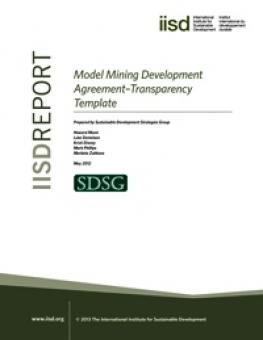
Model Mining Development Agreement - Transparency Template
This report was prepared by IISD in conjunction with Sustainable Development Strategies Group (SDSG).
It consists of a detailed analysis of the International Bar Association Mining Law Committee's Model Mining Development Agreement, or MMDA 1.0.
The MMDA was prepared based upon a detailed analysis of several dozen existing mine development agreements, and after a considerable process of consultation with stakeholders and experts in mining law and policy in many countries.
This report consists of four documents. The first is this executive summary and the table of contents. The second is a "template", which sets out each of the sections or headings in the MMDA, with a brief description of its subject matter and the issues it is designed to address.
Third is a lengthier explanatory narrative, and the fourth a brief report on the limited search undertaken for widely accepted or "model" oil and gas development agreements.
The MMDA is a template for use in negotiations between the national government of the host country and the mining company. Some sections of MMDA 1.0 refer to community agreements, but MMDA 1.0 itself is not a community development agreement. These are two different instruments, which may sometimes need to be used together.
Many of the concerns expressed about the clarity, quality and balance of mining agreements are ultimately concerns about imbalance of resources and capacity of the parties who negotiate the agreements. To some extent, comments also suggest that negotiation of effective mining development agreements is a very complex task that requires multidisciplinary help from accountants, tax specialists, mining lawyers, geologists and perhaps others. Some developing countries have difficulty fielding such negotiating teams, and there is a feeling that they are therefore disadvantaged in negotiations, regardless of the content of any proposed clauses, forms or models.
You might also be interested in
Evolving Standards on Stabilization
The publication reviews the evolution of stabilization clauses in mining contracts, highlighting the 2020 Organisation for Economic Co-operation and Development (OECD) Guiding Principles and offering guidance on its implementation toward a reduced use of stabilization clauses, and alternative approaches.
Mining Policy Framework Assessment: Bhutan
Identifying policy strengths, gaps, and recommendations to enhance mining governance in the country.
State of the Sector: Critical energy transition minerals for India
This report presents a comprehensive strategy for securing a reliable supply of critical energy transition materials (CETMs) essential to India's clean energy and low-carbon technology initiatives.
Gender-Responsive Mining Policies
This publication presents case studies detailing gender-responsive mining policies that support skills, employment, and inclusive governance.